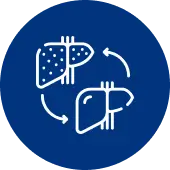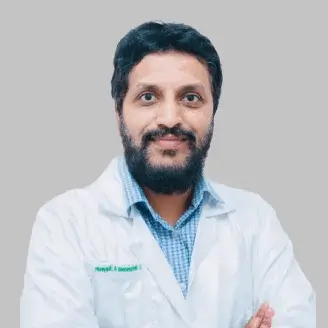Best Liver Transplant Hospital in Indore, Madhya Pradesh | CARE Hospitals
The Institute of Digestive Diseases and Liver Transplantation is a specialized group of experienced surgeons proficient in liver transplants and complex hepatobiliary, pancreatic (HPB), and gastrointestinal (GI) surgeries, all under one roof.
CARE CHL Hospitals, Indore provides a comprehensive, multi-disciplinary approach to treating irreversible liver disease, achieving outstanding patient survival rates and quality of life. We are equipped with dedicated operation theatres, ICUs, and state-of-the-art infrastructure and equipment to perform complex procedures.
Who Needs a Liver Transplant?
A liver transplant may be necessary for individuals with severe liver disease or liver failure. Specific conditions that often require a liver transplant include:
- Chronic liver failure
- Hepatitis B & C
- End-stage cirrhosis/ liver disease
- Alcoholic liver disease
- Fatty liver
- Primary Biliary cirrhosis / Autoimmune liver disease
- Primary liver cancer
- Acute liver failure
Types of Liver Transplant
Living Donor Liver Transplant
In a living donor liver transplant, a portion of the liver is removed from the donor. Because the liver has the ability to regenerate, both the transplanted section in the recipient and the remaining section in the donor can grow back to their normal size.
Deceased/ Orthotopic Liver Transplant
It involves transplanting a liver obtained from a person who died recently.
Split Transplant
In this procedure, a liver obtained from a deceased donor is divided into two pieces and transplanted into two different recipients. Both transplanted sections of liver can regenerate to reach a normal size in their respective recipients.
Liver Transplant Procedure
Pre-transplant evaluation
During the pre-transplant evaluation, you might undergo the following assessment tests to determine the condition of your liver:
- Physical examination
- Imaging tests
- Blood tests, including compatibility tests
You may also undergo tests to determine your heart and lung status. Nutrition and psychological evaluation can also be done as part of pre-transplant evaluation.
Approval
The transplant has to be obtained as per THE TRANSPLANTATION OF HUMAN ORGANS ACT 1994 & THE Transplantation of Human Organs Rules, 1995 and all amendments formed therein.
Liver Transplant Procedure
The liver transplant procedure may take up to 8 to 12 hours or more. During the procedure:
- Patient will be given general anesthesia to numb the pain.
- An incision is made in your abdomen to access the diseased liver.
- The blood vessels are cut off to stop the blood supply
- The diseased liver is removed and replaced with the healthy donor liver.
- The blood vessels and bile ducts are reattached to the replaced donor liver.
- The incision is closed with clips or stitches.
- Post-Transplant Care
You will be kept in the intensive care unit (ICU) for 4 to 5 days’ post-transplant. The recovery process is similar for all patients. However, the duration for recovery may differ for each person depending on how their body responds to the transplant, their health condition, and complications occurred, if any post-transplant.
Recipients usually stay in the hospital for 7 to 10 days and donors stay for 5 to 7 days.
To improve the outcomes, a person who underwent liver transplant should take the following precautions:
- Undergo regular medical checkups as per doctor’s recommendation.
- Be compliant and take medications as prescribed by the doctor.
- Be aware of the symptoms of infection or organ rejection and inform the doctor immediately or seek medical help.
- Follow safety precautions to avoid contagious illnesses such as common cold or flu
- Follow a diet-plan as recommended by the doctor/nutritionist.
- Be physically active.
- Avoid alcohol and tobacco use.
- Life after Liver Transplant
- Regaining of health and full energy
- Can enjoy normal food
- Can travel without fear
- Normal life expectancy
- Normal family life
- No drinking alcohol
- Regular medications
The liver transplant team at CIDDLT led by Dr Mohammed Abdun Nayeem has a cumulative experience of 2000+ liver transplants, one of the largest experiences of its kind in India, demonstrating internationally comparable clinical outcomes. Our novel surgical techniques have enabled fast tracking of patient post-operative recovery, shortening hospital stay.
A seamless patient pathway from pre-operative management, through surgery and postoperative care with our excellent outcomes makes us a favoured one stop centre for adult and paediatric liver transplants (living & deceased donor), and all complex HPB and GI surgeries.










